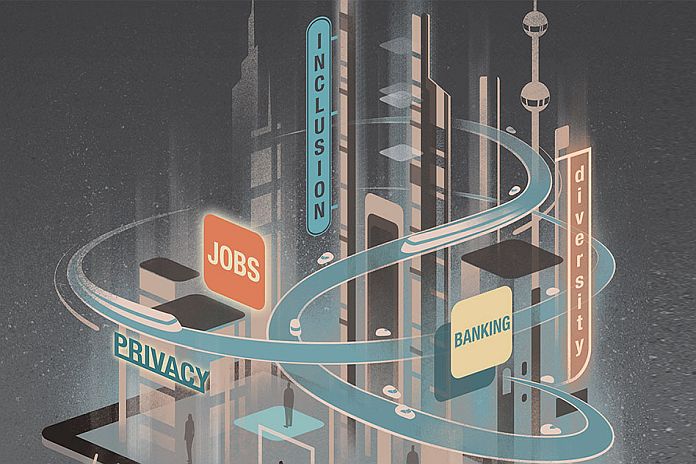By Gita Bhatt
Accelerated by the pandemic, the digital future is coming at us faster than ever before, and maybe faster than we can imagine. In this issue, we explore the possible consequences—the good, the bad, and the gray.
For millions, technology has been a lifeline, changing the way we work, learn, shop, and entertain ourselves. In a year like no other, it has spurred game-changing digital shifts. Governments moved quickly, using mobile solutions to provide cash assistance; financial technology has helped the survival, and in some cases, growth of small- and medium-sized businesses; and the first national digital currency, in The Bahamas, provides a glimpse of the future of money.
Despite the promise of digital transformation, it can also drive unequal outcomes in education, opportunities, and access to health care and financial services. Automation has destroyed jobs, some permanently. The chasm between the digitally connected and the unconnected—across and within countries and between rural and urban areas—has amplified social and economic inequalities.
Daron Acemoğlu underscores that the government can and should play a regulatory role, with incentives for innovation toward “human-friendly” technologies that produce good jobs. Hyun Song Shin and coauthors elaborate on smart policies that can bring more people—particularly the poorest—into the financial system. And Sierra Leone’s Minister of Education, David Sengeh, describes in an interview how he has made his country’s education system both more digital and more inclusive.
Clearly for such initiatives to succeed, as Cristina Duarte emphasizes, countries must scale up investment in digital infrastructure, such as access to electricity, mobile and internet coverage, and digital ID.
Still, there are real risks: Tim Maurer focuses on addressing cyber threats to the financial system. Yan Carrière-Swallow and Vikram Haksar suggest that commercial interests must be balanced with protection of privacy and data integrity. Other contributors illuminate digital taxation, data bias and ethics, and the need for global tech cooperation.
Digitalization can transform economies and lives. The key takeaway: innovation needs to have public value and be shaped to bring everyone into the digital age.
Elsewhere in this issue, IMF chief economist Gita Gopinath highlights in a Straight Talk column the stark divergence in prospects across countries, regions, and sectors and the needed policy actions on several fronts. Sam Bowles and Wendy Carlin advance the view that the pandemic, along with climate change, will alter thinking about economics and the social contract. And authors Ruchir Agarwal, Ina Ganguli, and Patrick Gaule find that policies that help identify and nurture young talent from poorer countries could advance the global knowledge frontier.
Finally, Prakash Loungani profiles Tel Aviv University’s Assaf Razin, early scholar of the promise and perils of globalization.
Read full issue here.






